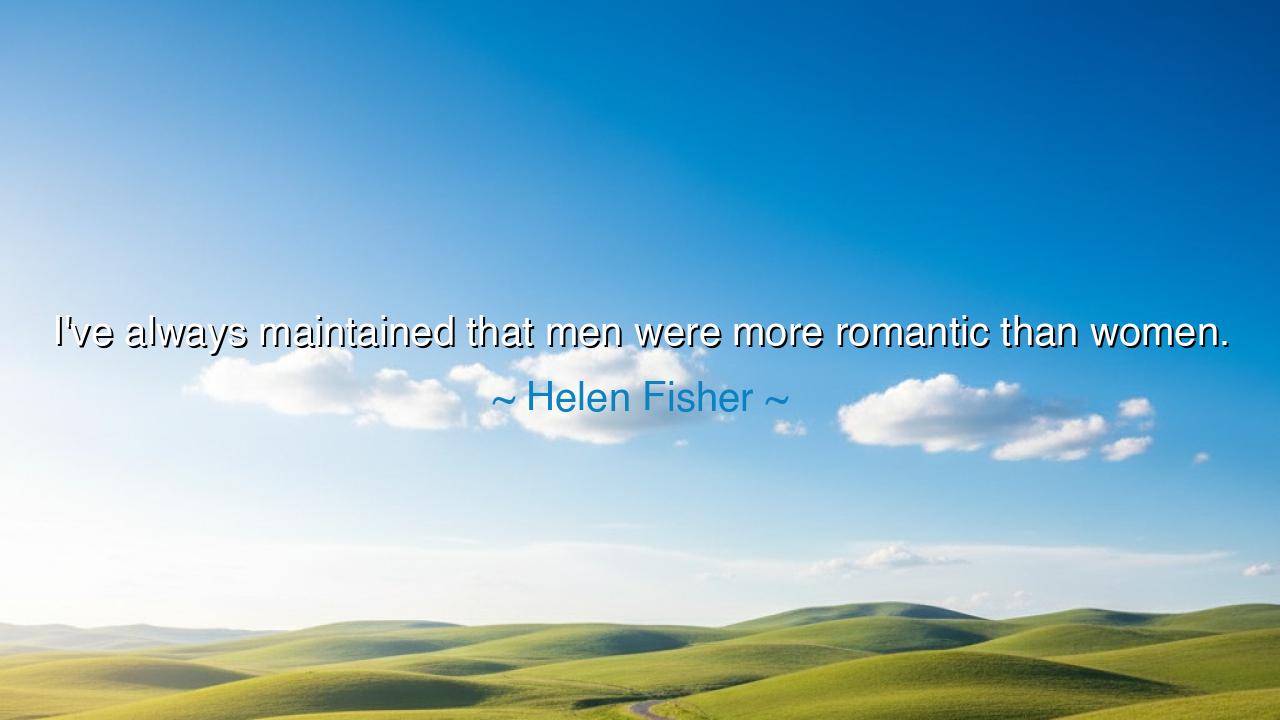
I've always maintained that men were more romantic than women.






“I’ve always maintained that men were more romantic than women.” Thus speaks Helen Fisher, a scholar of love’s mysteries, yet her words sound less like cold science and more like an oracle’s insight. For the thought is strange to the common ear, which so often casts women as the keepers of romance, the weavers of affection, the singers of longing. Yet Fisher turns this belief upon its head, revealing that in the hearts of men burns a fire often underestimated, a flame that leaps boldly toward devotion and sacrifice.
To be romantic is not merely to adorn life with flowers and verse. It is to pour the self into another, to imagine eternity in a single embrace, to dream of a bond unbroken by time. Men, as Fisher teaches, are often the first to surrender to this dream. They cast themselves forward with daring, declaring love quickly, envisioning futures before the ink of acquaintance has even dried. This is not weakness, but the courage of those who give their whole being to desire.
The ancients knew of this boldness. Consider Paris of Troy, who, smitten by Helen’s beauty, risked kingdoms and kindled wars for the sake of love. His act, though reckless, was undeniably romantic: to hazard all for the vision of a woman’s face. Or think of Orpheus, who descended into the underworld itself, armed with only his lyre, to reclaim Eurydice. Such are the deeds of men whose love burned beyond caution, whose hearts could not be content with half-measures.
Women, too, love with depth, but their romance is often tempered with patience, endurance, and the wisdom of time. Men, by contrast, leap into the torrent. They write letters that stretch across oceans, they kneel in streets to propose, they cross deserts and climb mountains, compelled by an inner force that does not count the cost. It is this daring abandon that Fisher calls attention to—a reminder that passion does not belong to one sex alone, but that men may, indeed, burn with a swifter flame.
Yet within this truth lies a warning. The romantic heart of a man can lead him to heights of nobility or to follies that undo him. Paris brought ruin to his city; Orpheus lost Eurydice in a final, fatal glance. Romance untempered by wisdom is like a wild horse, magnificent yet dangerous. But when guided by honor, when joined with loyalty and respect, it becomes a force of creation, binding souls in unshakable union.
The lesson is thus: do not dismiss the depth of men’s love, nor mock it as foolish or naive. Recognize it as the bold offering it is—a gift of energy, of vision, of sacrifice. And for men themselves, let them temper their fire with patience, lest their passion consume what they wish to protect. Let them remember that true romance is not only the grand gesture, but the daily act of devotion, the quiet constancy that proves the heart’s first cry was not fleeting but eternal.
Therefore, to all who seek wisdom: honor the fire of men and the endurance of women. See that both are needed, both are sacred, and both, when united, create the balance of love that sustains the world. And let every soul, man or woman, strive to love not with fear, but with the fullness of their nature—bold, enduring, and true. For in such love lies the highest romance, the kind that echoes through generations, carried like song upon the winds of time.






AAdministratorAdministrator
Welcome, honored guests. Please leave a comment, we will respond soon